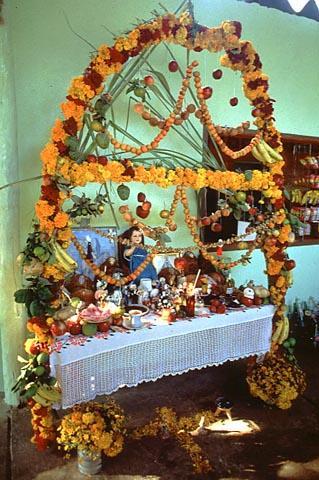
Rituals and traditions can provide a sense of place and timelessness. They offer us the opportunity of feeling connected to what has gone before and what will continue through the corridors of time. It seems to me that of the three countries in North America, Mexico has developed a culture that has some of the richest and most meaningful rituals. One in particular I have adopted as it gives me much that I did not have when I lived in Canada.
As happens to all of us, I have reached that age where death of loved ones and friends is a too often occurrence. Many of these deaths happened while I was living in Canada, and yes, the rituals of burial and memorial services were powerful in helping me work through the process of grieving their deaths and my losses. But after that was over, and the usual “time for grieving” had passed, there was nothing in my society that actively supported my continuing relationship to and feelings about these loved people who were no longer alive. Certainly they were gone, but my memory of them, of their lives, and of my life with them continued. The cultural expectation was that I dealt with all of this on my own, privately. So I did, but I never really felt that my process of doing so was finished.
As many do when they first move to Mexico, I experienced the Day of the Dead as a fascinating Mexican ritual. Wasn’t it wonderful how families in Mexico got together at this time of year? The practices that went with the event were curious and appeared to be fun – sugar skulls with your name on it; chocolate coffins, those skeleton puppets, the papier mache in so many colours and designs. Visiting the pantheons in the afternoon and evening and seeing all this festivity seemed so colourful and quaint – cleaning the grave sites, preparing the food and drink and laying out the personal items and decorations. Yet there was something there for them, for the participants, which I didn’t have and somehow missed.
The next year, I decided to incorporate the rituals associated with the Day of the Dead into my life and home. I discovered that for me, the time leading up to November 1 became a very personal celebration of the life and relationship I had to each person that I was including on the altar I was preparing. As I went through the process of getting photographs out, searching in the tianguis for the right candy skulls and coffins, preparing their favorite foods and drink, I discovered in myself a deep satisfaction and connection with each person and my memory of them.
I began to really understand what the Day of the Dead was all about. It wasn’t the rituals themselves that became meaningful, but rather the connection with each person that the ritual produced. I was not just mourning; I was celebrating who they were in my life and honouring their memory in ways that I had not felt were “OK” before. It is a practice that I look forward to each and every year.
Each November Issue, MexConnect includes an article or two about some aspect of the Day of the Dead in Mexico. This year we have chosen to honour two of our authors who died over the last two years and to celebrate their contributions to MexConnect. Shep Lenchek and Jim Tuck were two of the original supporters of and contributors to MexConnect. They were passionate in their love of Mexico and it shows in their writings. Each of them saw Mexico from a unique vantage point and their insights will always be available to us.
I could share these two strong personalities with you by writing an epitaph or biography; however I could never recreate them for you in a way that was meaningful beyond a description. What they each gave MexConnect and to me was a sense of energy and love for Mexico that was unique and gifted. The best I can do is prepare you for reading their articles and when you do, you will develop your own relationship with each man. I promise you, they will become part of your own pantheon of people who have given you insights into understanding this wonderful country and her people
Jim Tuck approached his Mexico with a particular love of history that was strongly coloured by his political and social beliefs. His articles on the various periods of Mexico’s development and the significant individuals who played a part in creating those times provides a perspective that is quite different from the traditional presentation of History. His writings were helpful to me in that he related Mexico’s story to events and people in the rest of the world in a way that allowed me to develop a more universal perspective of my adopted country. Reading Jim’s words will tell you more about who he was than I ever could.
Shep Lenchek’s love of Mexico came from a different place than Jim Tuck’s. For Shep, Mexico was its peoples and their stories. Shep loved to take a question about Mexico and then research until he found the passion that motivated the people involved in the story. From Shep I learned to look more deeply into the people and what contributed to their place in Mexico. Shep’s words reveal his passion for life.
So, dear Jim and dear Shep, thank you for being in my life and for making my passion for Mexico so much more deep and rich.
- Discover so much more on the: Day of the Dead Resource page.
